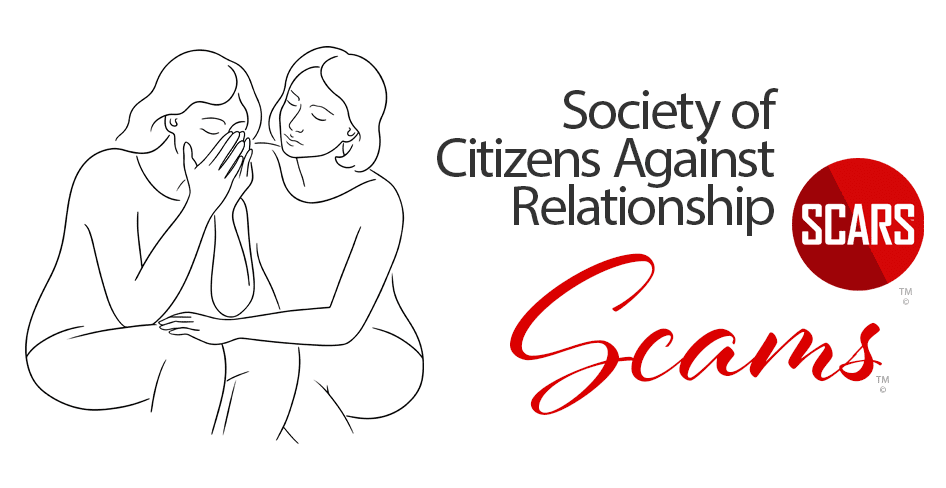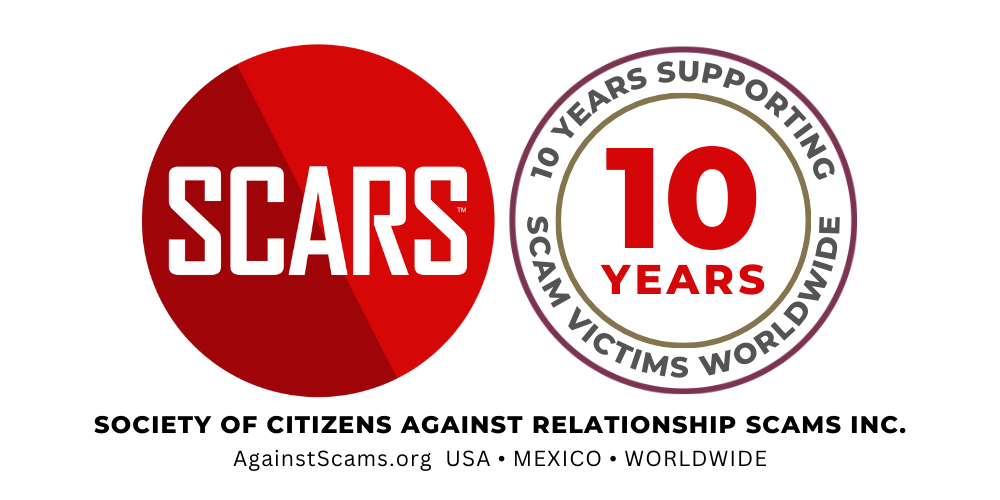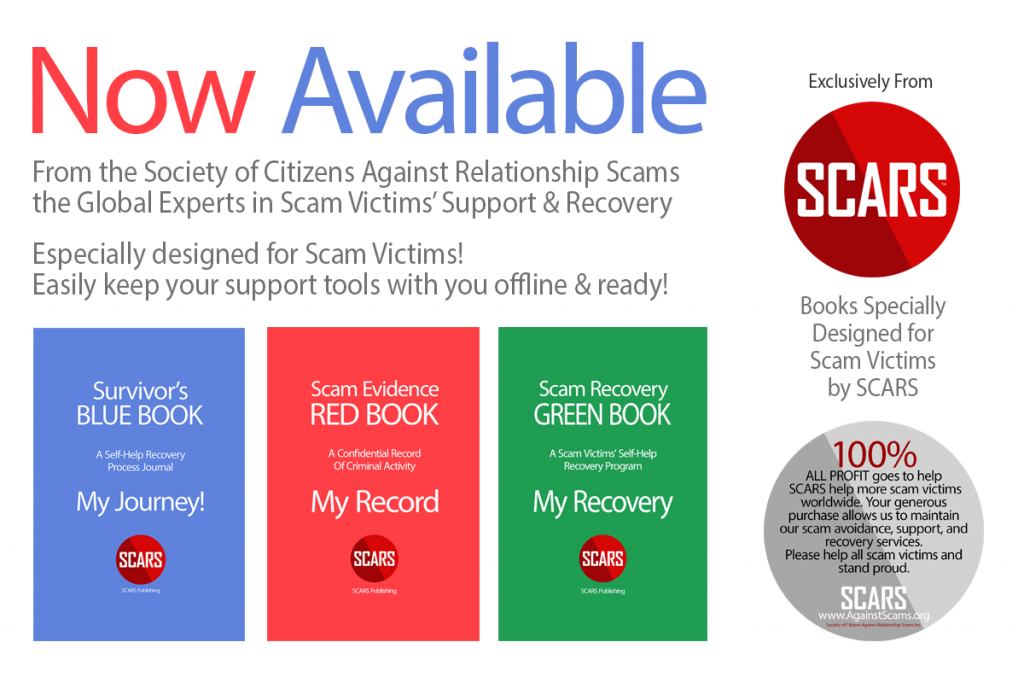SCARS Journalism Ethical Standard
This Standard Governs SCARS Interactions With the Press & Media
Compliance by journalists and allied professionals with the Standard is required for SCARS Officers and Team Members to participate or assist the media or press.
SCARS Policy: Guidelines for Interviewing Scam Victims
Purpose: The purpose of this policy of the Society of Citizens Against Relationship Scams Inc. is to provide clear guidelines for news journalists when conducting interviews with scam victims and to obtain the support or participation of SCARS.
It aims to ensure ethical and sensitive reporting practices that prioritize the well-being and dignity of the victims while accurately informing the public about the nature, methods, practices, and impact of scams.
-
Do No Harm:
-
Journalists must prioritize the well-being of scam victims and ensure that their dignity and privacy are respected throughout the interview process.
-
Avoid asking intrusive or triggering questions that may retraumatize the victim or exacerbate their distress.
-
Exercise sensitivity and empathy when discussing the victim’s experiences and avoid sensationalizing or exploiting their trauma for the sake of storytelling.
- Never interview a crime victim who has a diagnosed mental disorder or condition without the presence of a certified trauma-informed care provider, a psychologist, or other licensed mental healthcare professional.
-
-
Presence of Professional Support:
-
Journalists must ensure that a certified trauma-informed victim’s advocate or psychologist is present during the interview to provide support and guidance to the victim.
-
The advocate or psychologist should help control the flow of the interview, intervene if questions become too intrusive or triggering, and provide emotional support to the victim as needed.
-
-
Limitation on Intimate Relationship Issues:
-
Recognize that scams involve social engineering to lure victims in, then significant psychological grooming, manipulation, and control of relationships, emotions, and victim psychology.
-
Exercise discretion and sensitivity when discussing intimate relationship issues, ensuring that questions are relevant and necessary for understanding the victim’s experience and the crime.
-
Avoid prying into personal matters that may cause further distress to the victim or compromise their privacy.
-
-
Avoid Victim Blaming:
-
Journalists must refrain from blaming or shaming scam victims in interview questions or through the editing of the final piece, story, or video.
-
Avoid insinuating or implying that the victim is at fault for falling prey to the scam or questioning their intelligence or judgment.
-
Frame questions and narratives in a way that highlights the sophistication of scam tactics and the vulnerabilities exploited by perpetrators, rather than placing blame on the victim. Vulnerabilities include: previous traumas, mental state, cognitive biases, and psychological needs.
-
- Prohibited Terms and Language:
- Journalists are prohibited from using derogatory terms or language that disparages scam victims or the crimes they have experienced.
- Prohibited terms include but are not limited to “foolish,” “naive,” “gullible,” “stupid,” “catfish,” “catfishing,” “pig butchering,” and any other terms that may demean, belittle, minimize, or equivocate the victim’s experience.
-
Ethical Editing Practices:
-
Ensure that the final piece accurately reflects the victim’s experiences and perspectives without distorting or sensationalizing their story.
-
Avoid selective editing or manipulation of footage to portray the victim in a negative light or to fit a predetermined narrative.
-
Provide the victim with an opportunity to review the final edit of the interview and offer feedback or corrections before publication or broadcast.
-
-
Factual Reporting and Consultation:
-
Journalists must ensure factual accuracy in their reporting about the crimes committed by scammers and the impact on victims.
-
SCARS (Society of Citizens Against Relationship Scams) experts should be consulted in the planning, interviewing, and editing processes to provide insights into the dynamics of scams, the tactics used by scammers, and the psychological impact on victims.
-
SCARS experts can also offer perspectives on the perpetrators (the criminals) and techniques and tactics, as well as their societal situations, providing a more comprehensive understanding of the scam ecosystem.
-
-
Compliance and Accountability:
-
Journalists are expected to adhere to these guidelines and uphold the highest standards of ethical reporting in their interactions with scam victims.
- Journalists must agree to this policy in advance to obtain the support or participation of SCARS in any reporting or victim interviews.
-
Any violations of this policy will be subject to review by SCARS.
-
SCARS will provide training and education on ethical reporting practices and trauma-informed interviewing techniques to journalists to ensure compliance with this policy.
-
By adhering to these guidelines and consulting with SCARS experts, journalists can conduct interviews with scam victims in a manner that respects their dignity, promotes their well-being, and provides accurate and informative reporting to the public.
SCARS Policy 2024-04
To communicate with the SCARS Team please email us at press@AgainstScams.org
The Latest SCARS Corporate Posts:
Disclaimer:
SCARS IS A DIGITAL PUBLISHER AND DOES NOT OFFER HEALTH OR MEDICAL ADVICE, LEGAL ADVICE, FINANCIAL ADVICE, OR SERVICES THAT SCARS IS NOT LICENSED OR REGISTERED TO PERFORM.
IF YOU’RE FACING A MEDICAL EMERGENCY, CALL YOUR LOCAL EMERGENCY SERVICES IMMEDIATELY, OR VISIT THE NEAREST EMERGENCY ROOM OR URGENT CARE CENTER. YOU SHOULD CONSULT YOUR HEALTHCARE PROVIDER BEFORE FOLLOWING ANY MEDICALLY RELATED INFORMATION PRESENTED ON OUR PAGES.
ALWAYS CONSULT A LICENSED ATTORNEY FOR ANY ADVICE REGARDING LEGAL MATTERS.
A LICENSED FINANCIAL OR TAX PROFESSIONAL SHOULD BE CONSULTED BEFORE ACTING ON ANY INFORMATION RELATING TO YOUR PERSONAL FINANCES OR TAX RELATED ISSUES AND INFORMATION.
This content and other material contained on the website, apps, newsletter, and products (“Content”), is general in nature and for informational purposes only and does not constitute medical, legal, or financial advice; the Content is not intended to be a substitute for licensed or regulated professional advice. Always consult your doctor or other qualified healthcare provider, lawyer, financial, or tax professional with any questions you may have regarding the educational information contained herein. SCARS makes no guarantees about the efficacy of information described on or in SCARS’ Content. The information contained is subject to change and is not intended to cover all possible situations or effects. SCARS does not recommend or endorse any specific professional or care provider, product, service, or other information that may be mentioned in SCARS’ websites, apps, and Content unless explicitly identified as such.
The disclaimers herein are provided on this page for ease of reference. These disclaimers supplement and are a part of SCARS’ website’s Terms of Use.
Legal Notices:
All original content is Copyright © 1991 – 2023 Society of Citizens Against Relationship Scams Inc. (D.B.A SCARS) All Rights Reserved Worldwide & Webwide. Third-party copyrights acknowledge. Incorporated in the U.S. State of Florida, DBA registered.
SCARS, SCARS|INTERNATIONAL, SCARS, SCARS|SUPPORT, SCARS, RSN, Romance Scams Now, SCARS|INTERNATION, SCARS|WORLDWIDE, SCARS|GLOBAL, SCARS, Society of Citizens Against Relationship Scams, Society of Citizens Against Romance Scams, SCARS|ANYSCAM, Project Anyscam, Anyscam, SCARS|GOFCH, GOFCH, SCARS|CHINA, SCARS|CDN, SCARS|UK, SCARS|LATINOAMERICA, SCARS|MEMBER, SCARS|VOLUNTEER, SCARS SCARS Australia, Cybercriminal Data Network, Cobalt Alert, Scam Victims Support Group, SCARS ANGELS, SCARS RANGERS, SCARS MARSHALLS, SCARS PARTNERS, are all trademarks of Society of Citizens Against Relationship Scams Inc., All Rights Reserved Worldwide
Contact the law firm for the Society of Citizens Against Relationship Scams Incorporated by email at legal@AgainstScams.org



